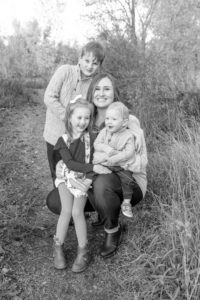Lyndsay

Disclaimer: The following article mentions the topic of suicide or other sensitive subjects, which may trigger negative thoughts and feelings for those currently suffering or still recovering from a mental or mood disorder. Reader discretion is advised.
Throughout my young adulthood and childhood, I witnessed other people struggling with depression and anxiety. I had never been able to truly understand these people and why they would just “let” something control their lives, even to the point of considering taking their own lives.
I experienced severe anxiety for the first time after the birth of my oldest son. I didn’t sleep for 3 days following his birth. I eventually came out of what I had considered “baby blues.” Looking back, I am certain I was struggling with a mild case of postpartum depression. I was exhausted, impatient, easy to anger, and beat myself up internally. How in the world could I be mad a 5-month-old for wanting me? After struggling with infertility for 4 years, there was no way I was willing to portray anything but utter bliss with my firstborn. I internalized everything and pushed myself beyond what was healthy.
When my son was 14 months old, I conceived my sweet daughter. We had some crazy family dynamics during my third trimester, and I was struggling with some depression. That was the first time I had ever experienced a suicidal thought. It was brief and fleeting. One thought told me to walk into an ER and take my own life and hope they would save my 34-week-old baby inside of me. I pushed the thought away and called myself theatrical and dramatic. I saw Emily’s story in February 2016, a month before I gave birth, and I told myself “that could never happen to me.” Unfortunately, I truly thought at the time those with better mental health had more mental stamina and strength.
After the birth of my daughter, I wasn’t hit with the severe anxiety I had experienced with my son. I surprisingly hit the ground running with a colicky baby who would only breastfeed and didn’t permit me much sleep. People were tentative to help me with my daughter; she would scream unless it was me holding her. I was doing everything for her on my own, although I did have help with my 2-year-old son. However, soon my postpartum depression become visible to me.
It was Labor Day weekend, and I was surrounded by a multitude of friends and family. Yet, I felt completely alone. I felt like there was a film between me and everything else, preventing me from truly feeling any of the joy I should be feeling. I found myself sitting in the bathroom, feeling completely disconnected from reality and lost in a storm of anxiety and sadness. In that bathroom I told myself, “I am not strong enough to do this. My kids don’t deserve a mom who breaks so easily.” I concluded I would take my own life that Tuesday while my husband was at work, after calling emergency services to ensure the safety of my children.
That decision made me sick; I dissolved in tears and eventually researched what to do if you are feeling suicidal. I told my husband what was going on and I eventually was able to see a doctor, who admitted me to the hospital. I was diagnosed with severe postpartum depression and postpartum psychosis. The decision was made I would go home under constant supervision, connect with a psychiatrist, and begin medication.
I hoped the medication would help, but I was also scared because I was having panic attacks. Things worsened when I again decided I was feeling confident enough to take my own life. Fortunately, before I carried out my suicide plan, I contacted my psychiatrist who prescribed a different medication that eventually stabilized my mood. I also received a new diagnosis of Bipolar Disorder Type 2.
I was so angry at the system that surrounded new mothers. I had little education about postpartum depression and other mental challenges that can accompany having children. This new information impacted my choice to not have any more children because I wasn’t willing to risk going through that nightmare again. With this new information, I spread awareness among my friends and family. I told my story to anyone who would listen. The “light” I found from this experience was an understanding for anyone struggling with mental health. I wanted to spread awareness. The mantra I’ve adopted is “You never know what someone is going through. BE KIND in your actions and your words.”
